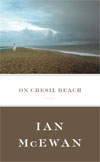|
On Chesil Beach by Ian McEwan Published by Nan A. talese 203 pages, 2007
|
The Landscape of Love Reviewed by David Abrams
Some writers work on large canvases -- wide, sprawling Dickensian landscapes which cover decades in the stride of less than ten pages -- while others have mastered the miniature. In his newest book, On Chesil Beach, Ian McEwan has taken the narrow-scope novel to its pointiest tip. On Chesil Beach covers eight hours in the lives of just-married Edward and Florence Mayhew as they sit in their honeymoon suite on the English coast and contemplate the night to come. The entire plot boils down to two simple questions: Will they or won't they have sex; and, if they do, will it destroy their relationship? I can't remember the last time the mere promise of sex had me as close to the edge of my seat as did On Chesil Beach. McEwan teases us along for 130 pages as tension and suspense build. I could not turn the pages fast enough as I watched Edward and Florence pick at their cooling dinner meal, speak to each other in fits and starts, struggle with an uncooperative dress zipper, and dart their tongues into each other's mouths during a suffocating French kiss. Sex is the hoped-for happy ending, yet we suspect those hopes might be dashed like a cold-water wave against the rocky beach just outside their hotel window. McEwan is a genius at making us care about, and fully understand, his characters in as short and tight a space as possible. There is not a wasted word here as he relentlessly drives us forward and deeper into Edward and Florence, two 22-year-olds fumbling their way toward sex. You'd have to go as far back as Henry James to find another writer who so confidently explores the complexities of human behavior and the sharp divisions of class. McEwan goes James one better by delivering prose that is lighter and less ponderous. What elevates On Chesil Beach from any other book you're likely to read this year is the brilliant way McEwan takes us inside Edward and Florence with just a subtle shift from one sentence to the next. We barely notice when we go from a bridegroom unknotting his tie to the moment, years earlier, when he learned a startling truth about his mother. We move between Edward and Florence like invisible, uninvited guests, privy to their dark tangle of fears and desires. And oh what fears and desires there are. Though she loves Edward, Florence is petrified at the thought of sex, the sloppy physical act which is practically guaranteed to hurt and mortify. Early in the novel, we learn she is feeling "a visceral dread, a helpless disgust as palpable as seasickness." Edward, on the other hand, is brimful with sexual desire after having sworn off masturbation for the week prior to the wedding ("He wanted to be in top form for his bride"). He is ready to consummate but he remains blinded to Florence's psychological agony. Edward's selfish myopia and Florence's reluctance to forthrightly express herself to him form the molten lava core of the novel. If these characters ever once had an honest conversation, On Chesil Beach would not be half as interesting. The novel starts off on a happy note ("they had so many plans, giddy plans, heaped up before them in the misty future"), but it isn't long before we're seeing troublesome cracks in the relationship as they walk a tightrope across a chasm of sex. During their courtship, Florence has only allowed Edward limited access to the mysteries of her body. By slow degrees, he first sees her naked breasts in October, touches them in December (on December 19, to be exact), then finally kisses them in February ("though not her nipples, which he grazed with his lips once, in May"). Florence, on the other hand, "allowed herself to advance across his own body with even greater caution." It's no coincidence that On Chesil Beach is set in 1962, on the eve of the sexual revolution and the same year Helen Gurley Brown published Sex and the Single Girl. The Beatles, Woodstock and "free love" can be seen on the horizon, but for now, Edward and Florence are constricted by the times in which they live. Even when they're alone, "a thousand unacknowledged rules still applied" as they enter adulthood with equal parts dread and longing. McEwan knows how to get maximum mileage out of imagery. The novel has scarcely begun when we come across this sentence: "In the next room, visible through the open door, was a four-poster bed, rather narrow, whose bedcover was pure white and stretched startlingly smooth, as though by no human hand." Someday, a graduate student will devote an entire thesis to deconstructing that single sentence with its narrow bed and its virgin-white sheets. Even the meal the couple eats is freighted with symbolism as they each dig in to a slice of melon "decorated by a single glazed cherry." This is a landmark novel which can be read quickly, but is certain to be slowly savored long after the last page is turned. Don't let the size of On Chesil Beach fool you. This is literature that expands with each paragraph. By the end of its 200 pages, McEwan has fully embraced the wide, wild landscape of love, telling us more about his characters (and ourselves) than we ever thought possible in such short space. | August 2007
David Abrams is a January Magazine contributing editor. He has written for Esquire, Glimmer Train Stories, The Greensboro Review, The Readerville Journal and other literary magazines. |

